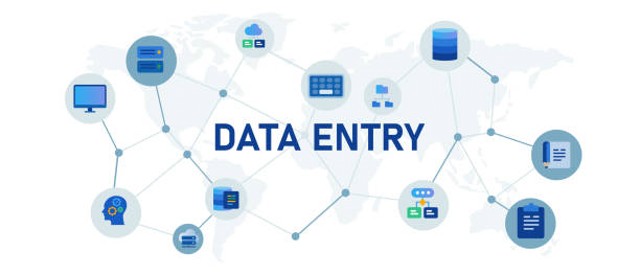Data is essential in today’s world. It helps businesses make informed decisions. But not all data work is the same. There are two main types of data-related jobs: data entry and data science. Both are important, but they are quite different.
This blog post will discuss data entry and data science in detail and the key differences between the two.
What is Data Entry?
This is the process of inputting, transcribing, or transferring data into a computer system or database. It involves typing information, scanning documents, or copying data from one source to another.
Data entry can be a repetitive and tedious task. But it is crucial for many organizations. Accurate data entry ensures that important information is captured and stored properly.
It can be done manually or with the help of technology. Some tasks may use optical character recognition (OCR) software to convert handwritten or printed documents into digital format. Other tasks may involve using data entry templates or forms to input information.
Effective data entry can help businesses streamline their operations and make better decisions.
READ ALSO: How to Become a Data Analyst With No Experience: Full Guide
Responsibilities of a Data Entry Professional
The main responsibilities of a professional in this role include:
1. Inputting data accurately
Data entry specialists must be meticulous in their work. They need to ensure that all data is entered correctly, without any mistakes or typos.
2. Organizing and maintaining data
The professionals are responsible for organizing and maintaining the data they work with. This may involve creating and updating databases, filing documents, or managing electronic records.
3. Adhering to data entry protocols
Many organizations have specific protocols or guidelines for data entry. The specialists must follow these protocols to ensure consistency and compliance.
4. Troubleshooting data-related issues
If there are any problems with the data, such as missing information or errors, data entry professionals may be tasked with identifying and resolving these issues.
5. Providing data summaries or reports
In some cases, data entry professionals may be asked to generate reports or summaries based on the data they have entered. This can help decision-makers understand the data more effectively.
READ ALSO: Benefits of cloud computing for small businesses: Best 10
Skills Required for Data Entry
Successful data entry professionals typically possess the following skills:
1. Typing speed and accuracy
Data entry requires the ability to type quickly and accurately. Employers often set minimum typing speed requirements for the position.
2. Attention to detail
Attention to detail is crucial in this role. Even a small mistake can have notable consequences for an organization.
3. Organizational skills
The professionals in this role must be able to organize and manage large volumes of data effectively. This may involve creating filing systems, maintaining databases, or using software.
4. Basic computer skills
Proficiency in using computers, including word processing, spreadsheet, and database software, is essential for this role.
5. Problem-solving skills
When issues arise with the data, the professionals must be able to identify and resolve the problems quickly and efficiently.
READ ALSO: Digital transformation in finance Industry: Trends and innovations
The Benefits of Data Entry
Data entry may seem like a simple or mundane task, but it offers several benefits to organizations:
1. Improved data accuracy
Accurate data entry is crucial for making informed decisions. By ensuring that data is entered correctly, data entry professionals help organizations avoid costly mistakes.
2. Enhanced data organization
Effective data entry and management can help organizations keep their data organized and easily accessible. This can streamline various business processes.
3. Increased productivity
By automating and streamlining data entry tasks, organizations can improve their overall productivity and efficiency.
4. Compliance and security
Many industries have strict regulations and standards for data management. The professionals help organizations maintain compliance and ensure the security of sensitive information.
5. Support for data-driven decision-making
The data entered by data entry professionals provides the foundation for data-driven decision-making. This can lead to more informed and strategic business decisions.
READ ALSO: B2B Digital Marketing Trends and Great Techniques to Stay Ahead
What is Data Science?
Data science is a field that combines computer science, statistics, and domain-specific knowledge to extract insights and value from data. It involves using advanced analytical techniques and technologies to analyze, interpret, and make sense of large, complex data sets.
Data scientists are responsible for transforming raw data into meaningful information that can be used to solve problems and drive business decisions. They use a variety of tools and techniques, such as machine learning, data mining, and predictive modeling, to uncover patterns, trends, and insights within the data.
Responsibilities of a Data Scientist
The main responsibilities of a data scientist include:
1. Data collection and preprocessing
Data scientists are responsible for gathering, cleaning, and preparing data for analysis. This may involve scraping data from various sources, handling missing or inconsistent data, and transforming the data into a format that can be easily analyzed.
2. Data analysis and modeling
Data scientists use advanced statistical and machine learning techniques to analyze data and develop models that can uncover insights and make predictions. This may involve building predictive models, identifying correlations, or clustering data.
3. Communicating findings
Data scientists must be able to effectively communicate their findings and recommendations to stakeholders, such as business leaders or decision-makers. This may involve creating visualizations, writing reports, or presenting their analysis.
4. Collaborating with cross-functional teams
Data scientists often work closely with other professionals, such as software engineers, domain experts, or business analysts, to understand the problem at hand and develop solutions.
5. Staying up-to-date with the latest trends and technologies
Data science is a rapidly evolving field, so data scientists must continuously learn and adapt to new tools, techniques, and best practices.
READ ALSO: Cloud Migration Process: How to Migrate to Cloud Successfully
Skills Required for Data Science
Successful data scientists typically possess the following skills:
1. Programming and coding
Data scientists must be proficient in programming languages such as Python, R, or SQL, which are used for data manipulation, analysis, and visualization.
2. Statistical and mathematical knowledge
Strong statistical and mathematical skills are essential for data scientists, as they need to understand concepts like probability, regression analysis, and hypothesis testing.
3. Machine learning and data mining
Data scientists must be skilled in applying machine learning algorithms and data mining techniques to extract insights from data.
4. Data visualization
Effective data visualization skills are crucial for data scientists to communicate their findings clearly and compellingly.
5. Domain-specific knowledge
Depending on the industry or application, data scientists may need to have in-depth knowledge of the domain they are working in, such as finance, healthcare, or manufacturing.
READ ALSO: 10 Best Skills Needed for Digital Marketing
The Benefits of Data Science
Data science offers several benefits to organizations:
1. Improved decision-making
By leveraging data-driven insights, organizations can make more informed and strategic decisions that can lead to better business outcomes.
2. Competitive advantage
Organizations that effectively utilize data science can gain a competitive edge by identifying new opportunities, optimizing operations, or developing innovative products and services.
3. Increased efficiency and cost savings
Data science can help organizations streamline their processes, automate tasks, and identify areas for cost savings.
4. Enhanced customer experience
Data science can be used better to understand customer behavior, preferences, and pain points, enabling organizations to deliver more personalized and satisfying experiences.
5. Innovative product development
Data science can be used to develop new products or services by uncovering unmet customer needs or identifying market opportunities.
READ ALSO: Digital Transformation Lessons Learned From Excellent Set-up
Data Entry vs. Data Science: Key Differences
While both data entry and data science involve working with data, there are several key differences between the two:
1. Scope and complexity
Data entry is a more focused and specific task, typically involving the input, organization, and maintenance of data. On the other hand, data science is a much broader field involving the entire data life cycle, from data collection to analysis and decision-making.
2. Analytical approach
Data entry professionals focus on ensuring the accuracy and organization of data, while data scientists use advanced analytical techniques to uncover insights and patterns within the data.
3. Technical skills
Data entry professionals typically require basic computer and typing skills, while data scientists need a stronger technical skillset, including programming, statistical analysis, and machine learning.
4. Decision-making
Data entry professionals support decision-making by providing accurate and organized data, while data scientists actively participate in the decision-making process by translating data insights into actionable recommendations.
5. Career path
Data entry is often considered an entry-level position, while data science is a more specialized and advanced career path that typically requires a higher level of education and experience.
READ ALSO: Top 9 Best Useful Business Analytics Skills in 2024
Understanding the Key Differences
To summarize the key differences between data entry and data science:
Data Entry:
– Focused on inputting, transcribing, and organizing data
– Requires attention to detail and strong organizational skills
– Involves tasks such as typing and scanning.
– Supports decision-making by providing accurate and organized data
Data Science:
– Focuses on extracting insights and value from data
– Requires a combination of technical, statistical, and domain-specific skills
– Involves advanced analytical techniques like machine learning and data mining
– Actively participates in the decision-making process by translating data insights into actionable recommendations
While both data entry and data science are important, they serve different purposes within an organization. Data entry professionals lay the foundation for data-driven decision-making, while data scientists leverage that data to uncover insights and drive strategic business outcomes.
READ ALSO: The 20 Outstanding Business Intelligence (BI) tools in 2024
Choosing the Right Career Path
When considering a career in data-related fields, it’s important to understand your strengths, interests, and career goals. If you have strong attention to detail, enjoy repetitive tasks, and are interested in data organization and maintenance, a data entry role may be a good fit.
On the other hand, if you’re more drawn to analytical problem-solving, enjoy using advanced technologies and techniques, and are passionate about uncovering insights that can drive business success, a career in data science may be more appealing.
Regardless of which path you choose, both data entry and data science offer valuable contributions to organizations and can be rewarding and fulfilling careers.
READ ALSO: Cybersecurity tips and tricks: How to stay safe online
Conclusion
Data entry and data science are two distinct but equally important data-related fields. While data entry professionals focus on the accurate and organized input of data, data scientists leverage advanced analytical techniques to uncover insights and drive strategic decision-making.
Recognizing the differences between these two roles is key to understanding the value that each one brings to an organization.
Whether you’re considering a career in data entry or data science, it’s important to assess your skills, interests, and career aspirations to determine the best path forward. Both roles offer unique opportunities for personal and professional growth and can lead to rewarding and fulfilling careers.







